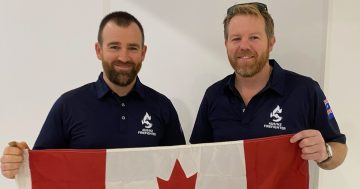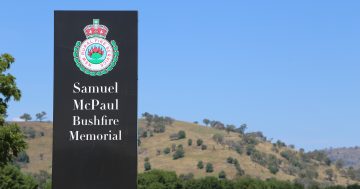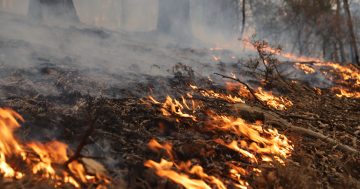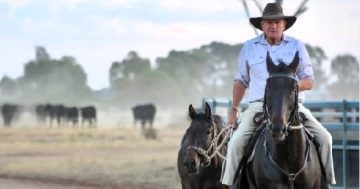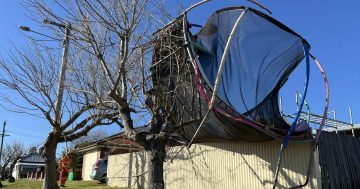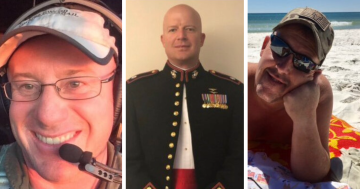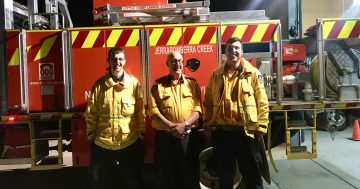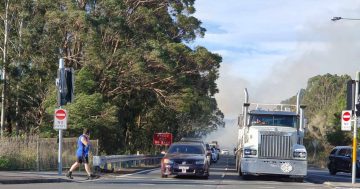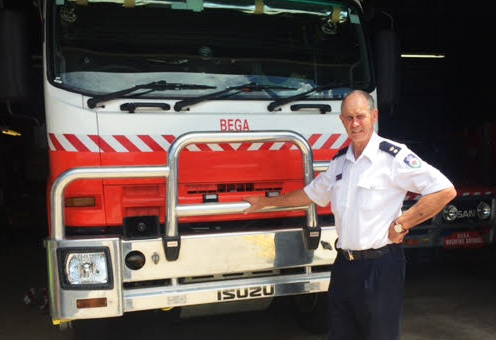
NSW Rural Fire Service Far South Coast district manager Superintendent John Cullen AFSM has hung up his boots after a long and rewarding career. Photo: NSW Rural Fire Service Far South Coast.
The NSW Rural Fire Service Far South Coast’s district manager, Superintendent John Cullen AFSM, has hung up his fire boots after 12 years in the region’s top job.
John was on the fire line for more than 40 years after he starting out with Imlay Shire Council in 1977. In 2000, he was awarded the Commissioner’s Commendation for Service; in 2012, he was awarded the National Medal; and in 2017, he was awarded the Australian Fire Service Medal for distinguished service.
Born and bred in Cobargo, and now living on a small beef farm in Bemboka, John worked on countless fires locally and interstate during his career, but he says the recent Black Summer bushfires hit hard when his old family farm house burnt down.
“When the old farm burnt, that fire hurt me,” he says.
John says working on the bushfires at Badja Forest Road, Currowan, Werri Berri and Clyde Mountain, as well as the Border Fire further south, was a memorable way to end his career with the NSW Rural Fire Service.
“The tenacity of the volunteers and the community, and the self-sacrifice they gave was incredible,” he says.
John cut his teeth with council, and says when a fire broke out it was “tools down and all hands on deck” extinguishing fires, doing track work and arranging dozers.
With plenty of field experience under his belt, he took on the role of Deputy Fire Control Officer for Bega Valley Shire in 1993, working under Phil Collins.
John became more involved with advising council on the fire risk to new developments, subdivisions and homes, and just one year into his role he was thrown into a big fire season, fighting blazes in Sydney and Eurobodalla during a time when coordinated firefighting efforts first came into play.
He took crews to assist with the Thredbo landslide disaster in 1997 and the Sydney hailstorm in 1999.
John worked both in the field and in incident control rooms on fire grounds stretching from the NSW North Coast to the Victorian border, including the 2002 bushfires that hit the Southern Highlands and Sussex Inlet when the first Erickson Air-Crane was brought into Australia.
In 2003, he took over as the Bega Valley Fire Commander and, in 2005 when the Bega and Eurobodalla teams amalgamated, John’s role changed and he became more involved with operations, community safety and fire investigations throughout NSW.
One of the biggest changes John saw in firefighting followed the 2009 Black Saturday bushfires in Victoria.
“It was a major event with a lot of damage and loss of life,” he says. “There were a lot of changes as a result of the inquiry – changes in the way fires are managed, methods of approaching fires, warnings and hazard reduction.”
As one of NSW’s most experienced firefighters, John was elevated to his most recent position in 2009, managing 49 NSW Rural Fire Service brigades, 11 staff and about 1800 volunteers across the Bega Valley and Eurobodalla shires.
His crews often support brigades in Bombala, Nowra, Cooma and Queanbeyan, as well as crossing into Victoria.
John’s job took him to hard campaign fires all across NSW, but the recent Black Summer bushfires, as well as the devastating Tathra and Yankees Gap bushfires in 2018, were some of the worst he’s seen.
He says his role was challenging, often exhausting, but ultimately rewarding.
“A lot of times in the early days in the 1990s, we’d get called out in the middle of the night to a major structure fire, car accident or a death,” he says. “It was hard. The job consumes you and requires enormous commitment – you can’t plan your life day to day.
“I couldn’t have done it without the support of my wife, Robyn, our three kids, Nathan, Bree and Mark, and all my wonderful, dedicated staff.”
John says he’s fortunate to have worked alongside thousands of volunteers, as well as members of different agencies, including the Forestry Corporation of NSW, NSW National Parks and Wildlife Service, Bega Valley Shire Council and various community groups.
“I’ve been blessed to have had those opportunities and blessed to have good help,” he says. “It’s very humbling to work alongside such wonderful people.”
John says community is the foundation of the NSW Rural Fire Service, and the fire stations are more than somewhere to train and store gear – they’re a meeting place for friends in small communities; a place to hold barbecues and Christmas parties; and by just being there, they encourage newcomers to the area to get involved.
John recalls the day the Belowra Fire Station opened in 2019, thanks to the efforts of Ewan and Kaye Thomson who had been NSW Rural Fire Service members for 61 years and 51 years, respectively.
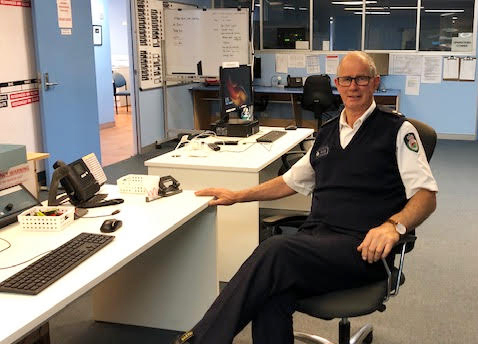
NSW Rural Fire Service Far South Coast district manager, Superintendent John Cullen AFSM, has retired after 40 years in firefighting. Photo: NSW Rural Fire Service Far South Coast.
“It wasn’t easy to establish the station and get it up and running in such a small community, but it really gave me a buzz to see it open,” he says.
“When the Badja Road Fire came through, that small brigade saved a lot of homes and lives.”
There were a lot of developments in firefighting during John’s 40 years on the job, but he says technology has made an incredible difference to the way fires are fought and the way the community is informed.
“We’ve got a greater responsibility today to keep the community informed with fire danger ratings and apps,” he says.
“Reporting and preparing communities is so important. When it come to fighting fires, we have seen huge improvements in the way we prepare for fires and manage incidents, with better trucks, radios, aircraft and the ability to predict the weather.
“Mobile phones are amazing as you can have all the intelligence in the palm of your hand.”
John says it’s important for firefighters to find time to clear their head after a major incident, and he has always enjoyed playing sport, spending time working on his farm and in his garden.
“The game can be pretty rough and tumble, but during the years you accept that, at times, things don’t always go well,” he says. “You just do the best you can at incidents, but know you’re going to have some wins and some losses.”
In retirement, John’s looking forward to spending time on his farm, gardening and finding “time to breathe”.
“I really want to get my breath back and do some things around the farm I haven’t had time to do,” he says.
“But this game won’t leave your head. I’ll keep involved with the service here, volunteering and helping out with training and with the community, particularly in areas where people are doing it tough.”







